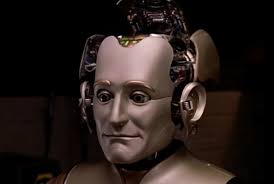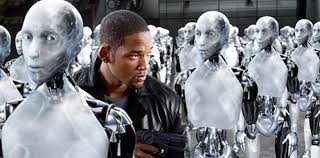
January 2nd marked the centenary of Isaac Asimov’s birth in Petrovichi, in the former USSR.
If you are reading this blog, which is a blog about fantasy and science fiction, then you are probably already a fan of Asimov, or at the very least you are aware of his writing. You’ve probably seen the films “Bicentennial Man” with the late Robin Williams and “I, Robot” starring Will Smith, but did you know that Isaac was such a prolific writer of both fiction and non-fiction and wrote on such a variety of subjects, including poetry, letters and post-cards as well as novels and short stories that he is the only author whose works are included in 9 of the 10 categories of writing of the Dewey Decimal System, the system by which libraries categorise the written word. This is the system that allows you to find the book you’re looking for when you head to your local library. (If anyone does that for books any longer.) This, in itself, is a rather amazing fact for any writer.
If you are into science fiction, then you probably know that Asimov also came up with the three laws of robotics which state:
- A robot may not injure a human being or, through inaction, allow a human being to come to harm.
- A robot must obey the orders given it by human beings except where such orders would conflict with the First Law.
- A robot must protect its own existence as long as such protection does not conflict with the First or Second Laws
Although we are given a foreshadowing of these laws in previous works it was in the short story “Runaround” (1942) that they were first introduced.
The idea of a robot or mechanical humanoid form was not Asimov’s, of course. The word “robot” comes from the Czech language and was introduced to us by Josef Capek in his play “R.U.R. (Rossum’s Universal Robots)”, (1920) but Asimov took Capek’s idea and ran with it. It was Asimov who invented the word “robotics”, defined in the OED as “The technology or science of the design, construction, operation, and use of robots and similar automatic devices.”

That wasn’t the only word Asimov introduced into the English language, however. He also gave us two more important scientific words – “psychohistory” (the theory that the history of large populations is statistically predictable, based on psychological theories of human and social behavior) and “positronic” (originally a technological device that provides a robot with a consciousness recognizable to humans.) This word became important in science because a sub-atomic particle was later named a “positron” and the word “positronic” then took the meaning of an adjective to describe anything related to positrons.

Another fact that many Asimov fans might not know (I certainly didn’t until I was researching for this post) was that he also wrote smutty limericks. He wrote lewd lines by the dozens and ended up publishing 5 volumes. Here’s an example of one of these dirty limericks.
There was a sweet girl of Decatur
Who went to sea on a freighter.
She was screwed by the master
-An utter disaster-
But the crew all made up for it later.
With regard to his personal life, Asimov was an atheist and became president of the American Humanist Association, an organization which promotes (among other things and put very simplistically) the idea that people don’t need a god to be good. Although he was tolerant of other people’s religious beliefs, he hated anything superstitious or pseudoscientific being passed off as “real science”. He also once wrote this quotation,
“If I were not an atheist, I would believe in a God who would choose to save people on the basis of the totality of their lives and not the pattern of their words. I think he would prefer an honest and righteous atheist to a TV preacher whose every word is God, God, God, and whose every deed is foul, foul, foul”.
In this matter, I could not agree with him more!
I also discovered a number of audio versions of Asimov’s works on Youtube which I definitely intend to check out. I suggest you do too, my readers.
Thank you for reading.
(I do not own the right to any pictures in this blog)

Interesting read. Haven’t read Anything by Asimov for years – perhaps it’s time for a few re-reads!
LikeLike
Although I’m not a sci-fi fan, I have enjoyed many of his stories. He was amazingly prolific. Interesting article — who would imagine he also wrote lewd limericks —
LikeLike
One of my favorite authors. He’s influenced all of my writing! Thanks for sharing 🙂
LikeLike
Thank you, Nicholas. I really enjoy your work too. It’s very interesting.
LikeLiked by 1 person
Thank you so much 😀
LikeLike